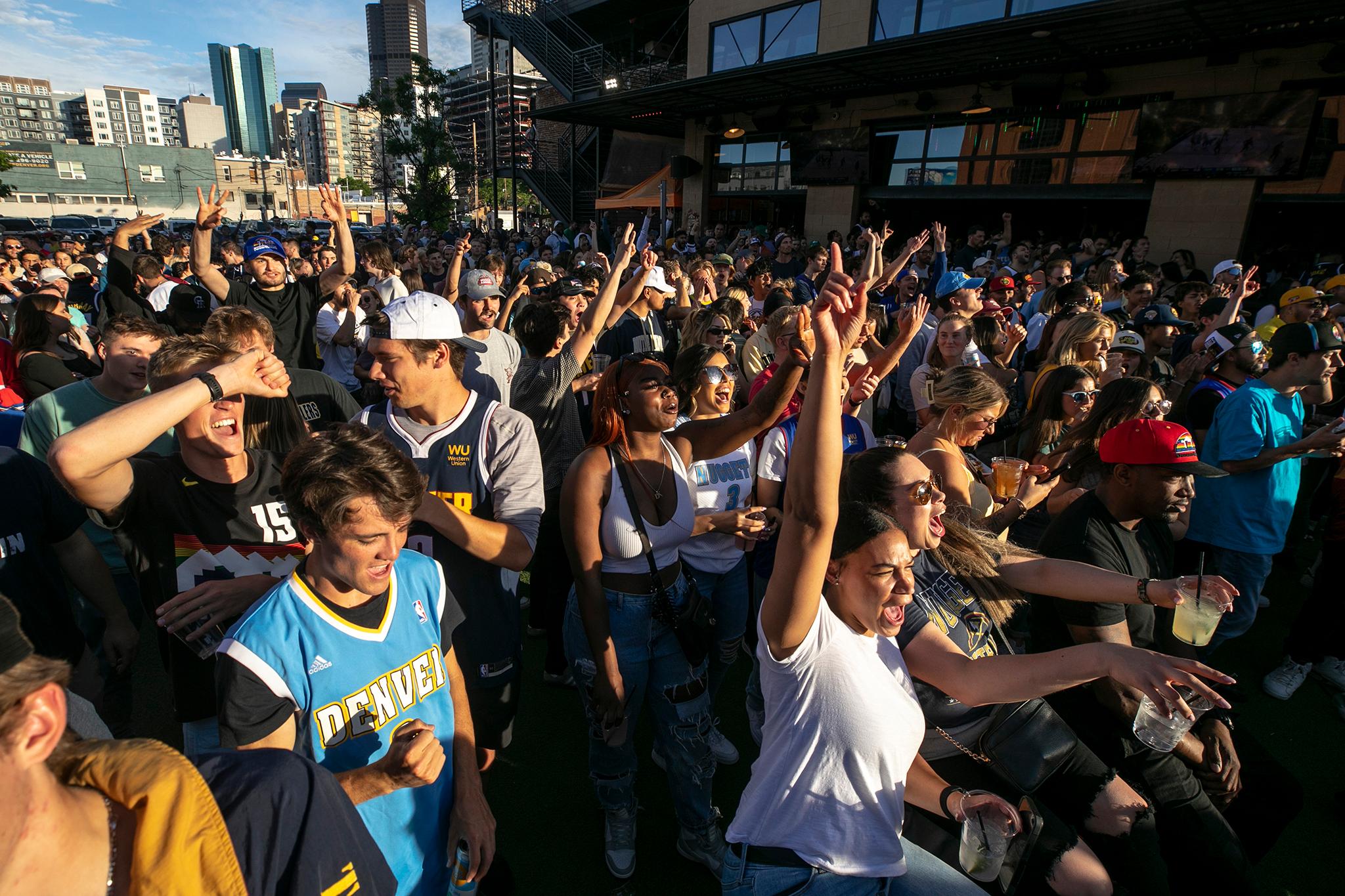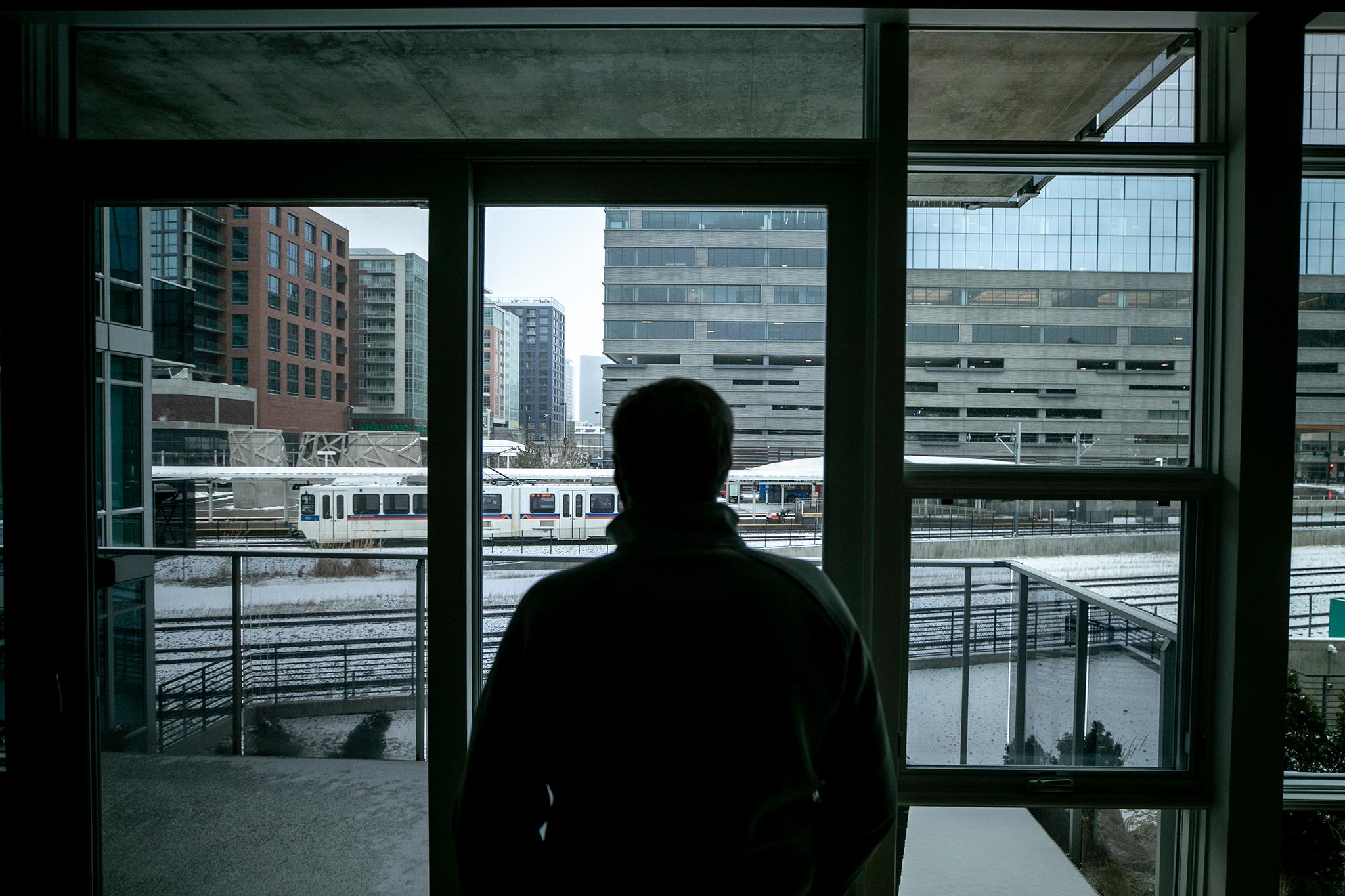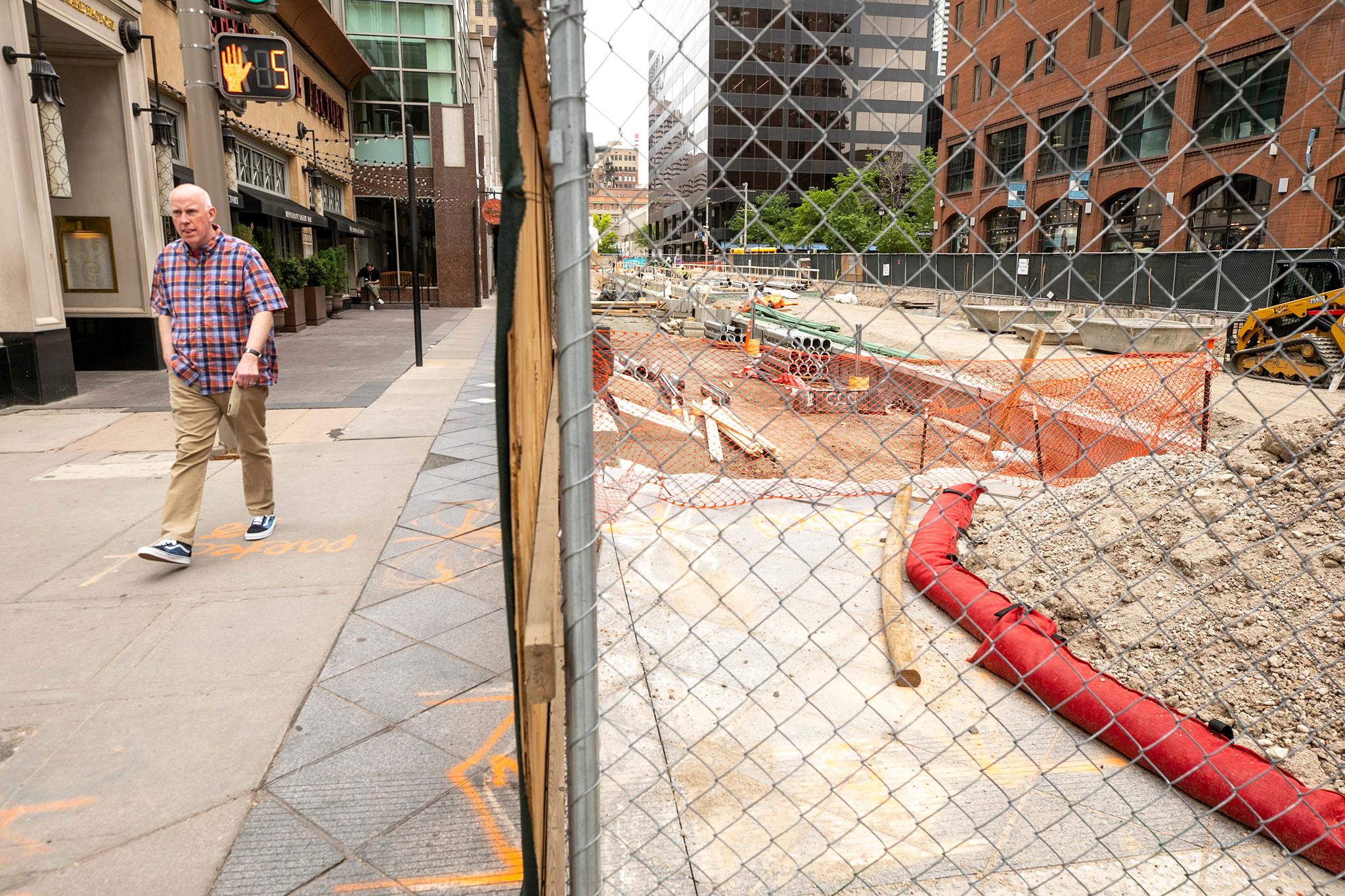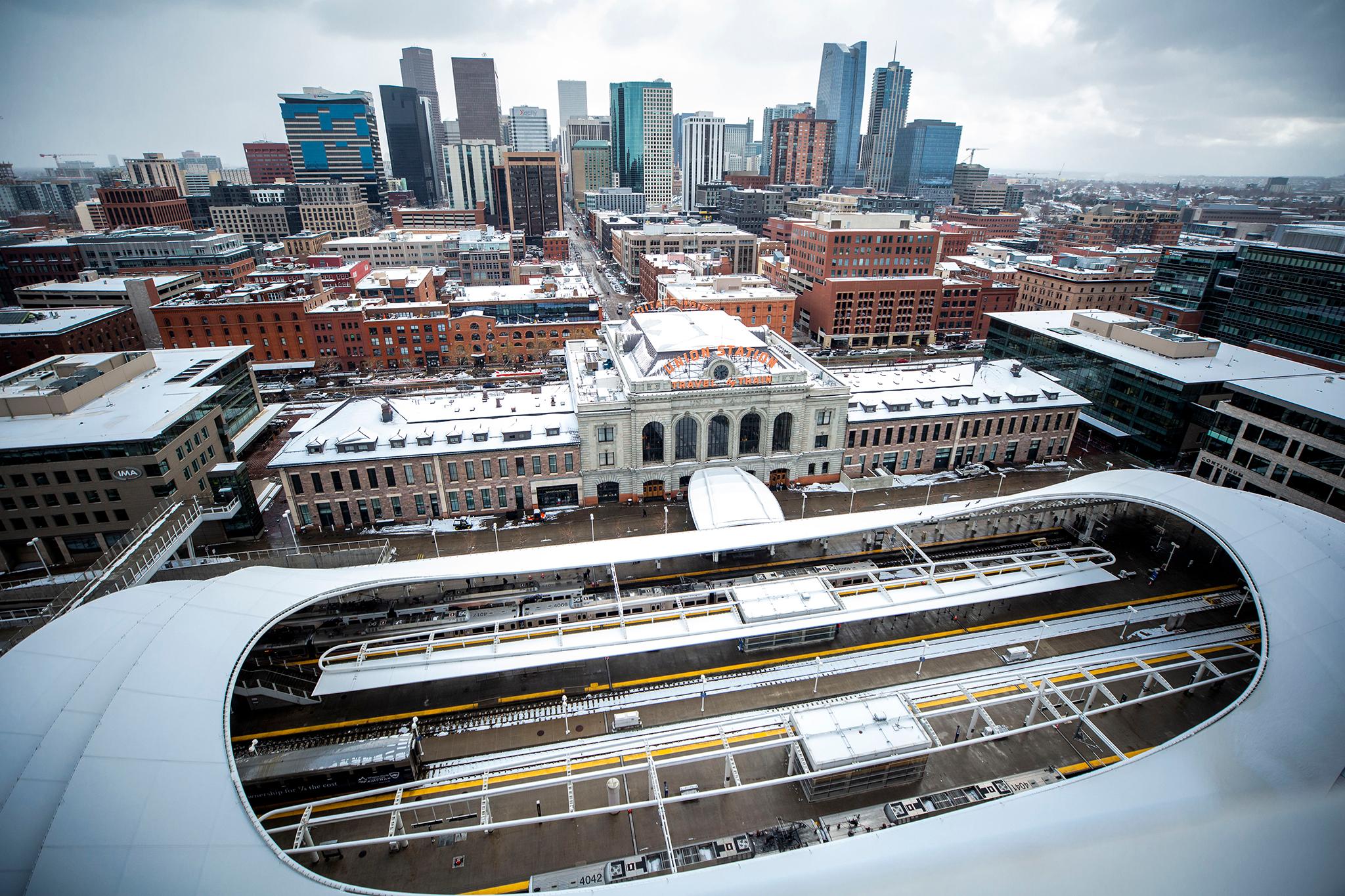Moods were high as the Denver Nuggets took the stage in front of the City and County Building. The sun was out after a spell of storms. Families from the suburbs and the city's 78 neighborhoods, downtown dwellers, office workers and unhoused residents alike crammed into Civic Center Park to celebrate their NBA champions.
Downtown came alive -- with cannabis scenting the air and a crowd roaring. Civic pride looked restored, at least for a couple of hours, after some bleak pandemic years and the city's ongoing struggles with poverty, crime and a precarious economy.
Assante Orr, who grew up in Park Hill and lives in the city center, attended the parade with his baby. The sight of seeing his team celebrate an NBA title for the first time brought him much joy, but so did seeing the streets full again after they emptied when the pandemic started.
This moment, he hoped, would boost Denver's reputation.
"We ain't really had a win for the city," he said. "The Lakers have a big name. The Celtics have a big name. Now we've got a big name. We're putting our name out there. Everybody's going to know it now."
But it wasn't Orr's shared joy with the hundreds of thousands of parade-goers that made international headlines.
An hour later, gunshots rang out near 17th Avenue and Curtis Street. Two people were injured -- a sad conclusion to a mostly joyous day.
Out-of-state media claimed Denver had descended into chaos. By the end of the week, at least 16 had been shot across the city, and at least three others were killed.

The violence was a stark reminder: Since the early days of the pandemic, downtown Denver's been struggling.
As the pandemic hit, companies sent workers home, and many never came back regularly. The downtown economy suffered from a lack of foot traffic. Skyscrapers stood empty, and commercial real estate dropped in value. Restaurants and businesses have been shuttering their doors -- some for good.
The number of people struggling to stay housed multiplied, and evictions spiked, as rents and home prices rose. So did visible homelessness, encampments and brutal sweeps, with the city punting unhoused people from one street corner to the next.
Fentanyl hit the drug supply, leading to the worst opioid overdose crisis in recent memory, said Lisa Raville, head of the Harm Reduction Action Center. Denverites who had been able to hold jobs and stay housed while still using opioids were now in a relentless race to avoid withdrawal. Drug and property crimes and car thefts all rose.
In 2021, Major League Baseball's All-Star Game came to town, Hancock and the Downtown Denver Partnership launched an All-Star Summer. But the celebrations then were also short-lived.

Late that year, the head of the transit union blasted the recently revitalized Union Station as "a lawless hellhole." Downtown residents in condos built in the past decade said they no longer felt safe. Some were arming themselves. Public panic fueled the Hancock administration's so-called "compassionate crackdown" on crime -- a mix of muscular policing, collaborations with federal prosecutors and some social services.
The Avalanche's NHL championship victory of 2021 brought 500,000 people to the city center for an epic party, but most days, things were eerily quiet.
The Downtown Denver Partnership responded by seeding new businesses in empty storefronts on the 16th Street Mall. Those business owners soon found their new shops plagued by crime.

Denver's reputation suffered.
Beating up on the city became a talking point for conservative media and suburban and rural lawmakers alike. They stoked the idea that the Democratic-run city had fallen into utter disrepair, and has continued to blast the city as an exercise in failed liberal politics.
The Colfax Avenue bus earned a Washington Post headline, "Anger and heartbreak on Bus No. 15," about a driver facing daily crime -- a devastating, up-close portrait of a city and transit system plagued with drug addiction, mental health issues and violence.
In recent weeks, Police Chief Ron Thomas has said Denver was on track to surpass the gun violence of the Summer of Violence, in 1993, when a gang war led to multiple homicides.
As the city suffered, Denver's population began a slight decline from 717,488 in 2020 to 711,973 in 2021, according to the Colorado State Demography Office.
State lawmakers have been hesitant to pass progressive policies aimed at fixing some of Denver's ills.
In the last legislative session, as Denver lawmakers tried to address some of the biggest issues in the city through statewide policy, calling for an end to bans on local rent control and supervised drug-use sites, a just-cause eviction policy, and a statewide end to single-unit zoning, rural and suburban lawmakers recoiled. They argued the state shouldn't shoulder the burdens of Denver. Those proposals failed to pass.
"Legislators from all over the state come to Denver to make policy for the entire state," said Roger Hudson, deputy chief of staff for the Colorado GOP and a Castle Pines City Council member. "So Denver, whether you like it or not, influences all of those laws, because we come here to make decisions about the state."
Some lawmakers see encampments across the street from the Capitol and hear sirens from outside the window, he explained. Those experiences influence how Republicans debate the biggest issues, and Denver -- and its Democratic leadership -- is viewed as a major reason things aren't working.
"Denver needs to deal with Denver first," Hudson said, "before making the rest of Colorado fall into line with Denver's problems."

Those Denver problems mostly kept Will Hudson, Kiersten Parker and their three children away until last week, when they enjoyed a picnic in Civic Center Park, as Denver celebrated the Nuggets' win.
The couple, who grew up in Denver and now live near Commerce City, used to enjoy bringing their kids downtown for the Chalk Art Festival and street-party playgrounds.
"We actually don't come to Denver as much anymore," Parker says. "It seems a little bit more sketchy, more and more when we come."
"I used to come down to Denver all the time," Hudson says. "But now that I got kids?"
The last time the family came down was during the Zombie Crawl. A man followed the family, frightening them.
"We were a little reluctant to come until today," he said. "But we're having fun."

A few years back, Denver was booming.
Cranes speckled the skyline. New apartments rose. Downtown offices were filled, and more were going up every day. Union Station, the 16th Street Mall and Larimer Square, which had been revitalized, bustled.
While old-timers recoiled at all the change and many were priced out, the endless stream of newcomers moving to town for an economic boom kept the city's population rising.
Every month it seemed like a national publication or marketing firm was identifying Denver as the next up-and-coming city, one of the best places in the country to live.
For city boosters, branding Denver to tourists and companies looking to relocate was a breeze. Denver was vying to be the nation's capital of everything from electronic dance music, street art and breweries to cannabis and the outdoor industry. Nature offered endless recreational opportunities a short drive away.
Yet Denver's living mayors have all acknowledged that they didn't foresee Denver booming quite so much and some of the unintended consequences -- including the loss of some of its cultural diversity.
Working-class people and even middle-class professionals faced displacement. Black and Latino Denverites, too often underpaid and undervalued by the establishment, were forced to move, as wealthy whites from other cities replaced them.
For many, the taste of the economic boom was bitter. The cost of living was too high and good paying jobs were too few.
The Hancock administration acknowledged the displacement after two terms in office and tried to put some efforts in place to curb it.
Mike Johnston, who takes the reins from Hancock on July 17, will inherit Hancock's work and the issues he's not successfully tackled.

At the Nuggets festivities, fans were quick to contrast the fun they were having with the experiences of people suffering without homes on the streets.
Sisters Chloe and Sophia Wilson were in town from Westminster with their parents. Both love to come downtown whenever they can.
"I feel like everyone's vibing with each other," Chloe said. "I feel like we're all just enjoying this moment together as a community."
But her sister Sophia added, "I'm just concerned about the homelessness. I feel like we should fix that. Or help clean up the streets a little bit and make it better for everybody involved -- all parties."
Orr, also took a break from celebrating the Nuggets, to raise concerns he hopes Johnston addresses.
"I want him to work on poverty and the homeless people down here," he said. "They don't deserve that. It's not right for them that they have nowhere to stay. And I know we got the money to take care that. Because I know they shouldn't be down here and get kicked off the street for trying to sleep somewhere."

In a general election where nearly every candidate raised similar concerns about homelessness, Johnston won with a sprawling, optimistic vision: Making Denver America's best city.
He plans to do that by continuing to attract new businesses and keeping longtime residents on the verge of displacement in town and ending homelessness in four years and dedicating more funding to build the city's cultural scene and making sure artists stay in town.
"There's a real path to make Denver America's best city," Johnston told Denverite. "And that means it being a great place to raise a family. It means being a great place to start a business. It means a place where you feel safe in your neighborhood and downtown. It means a place where you can still afford to live in the City and County of Denver."
Johnston said he views himself as being Denver's "Cheerleader in Chief" to pitch downtown businesses on staying put and for new ones to move into the area.
City boosters acknowledge they have their work cut out for them marketing the city, fostering business and ensuring that the bets companies made on urban growth come true. They're eager to collaborate with Johnston on his ambitions.
"We definitely have our foot on the gas when it comes to business retention and recruitment," said Downtown Denver Partnership CEO Kourtny Garrett, who serves on Johnston's transition committee.
As the Partnership markets the city, it focuses on job opportunities, quality of life, access to nature and recreation, she said. All that's still an easy sell.
But a drop in Denver's affordability has made that work more challenging.

"I think that's certainly one of our Achilles' heels," Garrett said. "We have to address both what would traditionally be called the lower-income affordability as well as the 'missing middle workforce housing,'" which is what allows workers to stay in town, near their jobs, and which could help keep downtown Denver thriving.
The Partnership is also pushing for a greater diversity of housing downtown, including everything from micro-units to three bedrooms where small families could live. Currently, the new housing is suitable for mostly young, childless professionals and empty nesters, and if Downtown's going to thrive, the diversity of who lives in the city center needs to expand to include families and the workforce.
Garrett's aware that, by some counts, Denver's national reputation has plunged.
In U.S. News and World Report's recent report on the best places to live, the city dropped from second place in 2020 to 99th in 2023, largely because of the rapid increase in the price of living, as the Denver Gazette reported. High crime rates didn't help.
"We want to give those types of rankings their due value and use them as moments of self reflection, to acknowledge some of the challenges that we've had," she said. "At the same time. I also recognize that those rankings can't always stay the same."
Long-struggling mid-sized cities in the middle of the country have been peaking on the lists, while cities that were booming are in decline.
"A lot of the rapid market growth that we've seen on both coasts, particularly in California, a lot of those same trends have happened here," Garrett said.
Garrett sees some possibility in the dip.
"I think when you see these types of plateaus in markets, there are tremendous opportunities for catalysts to come in," she said, pointing to historic developments in Denver like the remodel of Union Station and the growth of the surrounding neighborhood.
"Today we're looking at these huge catalytic moves like the reconstruction of 16th, like the River Mile development, Ball Arena development, AHEC (the Auraria Higher Education Campus) and the connections over Speer and really bringing that campus into a true part of downtown," she explained, referring to a cluster of projects that could double the population of the city center. "I think we're at a moment where we are seeing tremendous opportunity. And that is partially due to saying, 'Okay, we've had so much growth over the last 20 years. What do the next 20, 30, 40 years look like for downtown?'"

Through most of the pandemic, downtown residential occupancy and construction have not dipped, though the city center saw the first signs of a drop in housing prices and continues to be a cool market, according to the Denver Metro Association of Realtors.
The Partnership sees promise in turning vacant office space into homes -- a process that can be challenging and expensive under current permitting rules.
"The new construction is without a doubt easier," Garrett said. "However, with the right mechanisms, with the right processes in place, the right financial tools to make up for financial deltas, it is absolutely achievable, and can deliver some of the most valuable residential projects."
She's seen it work in other cities. So why isn't Denver on it yet?
"It's just an evolution in our development cycle," she said. "Denver has seen tremendously high occupancy rates from a commercial standpoint, so that's just not been a focus. I think now, it's just a matter of the city refocusing and saying, 'We are seeing a vacancy rate that's higher than what we've seen over the last 20 years.' So what do we do? We're developing a strategy around that."

Despite the lack of growth in the past couple of years, the growth mentality continues among business boosters.
"We launched a business recruitment program this year," said Laura Rodriguez, the vice president of economic competitiveness and corporate attraction for the Denver Metro Chamber of Commerce. "We represent nine counties and over 70 communities, and we go on a monthly basis to another market to speak with CEOs and company lead decision makers on opportunities in the metro area."
The goal, in those trips, is to pitch the Metro as a place for business expansion. The strategy is reactive. Those metros the Chamber recruits from have similar industries, like tech, bioscience and aerospace. But the areas have become too expensive for workers to build a good life.
"We're going to markets that are higher cost, so they see us as relatively more affordable," Rodriguez said. "So we want to capture any growth opportunities."
And there are plenty of other selling points.
Denver boasts one of the highest labor participation rates in the country, Rodriguez said. That means there are more people either employed or looking for work than in most other metros. The city has a high concentration of millennials in "prime working age," which the Chamber emphasizes in conversations with businesses.

In the fall, the Chamber hosts a weeklong event for CEOs and corporate site selectors. The organization offers helicopter tours. University programs tied to the industries the Chamber promotes give presentations. The corporate leaders learn about transportation infrastructure, the geography of the metro area and its cultural offerings. Companies already located here, like Xcel Energy, sponsor the event and tout the perks of doing business in Denver.
The Chamber highlights the eco-friendly corporate climate along with the business-friendly nature of the state, where lower income taxes and fewer regulations than Denver's competitors have made it a cheaper place to operate.
While new fees and taxes have been created by state and local government, they pale in comparison to those in the big coastal cities, Rodriguez said.
The Chamber, which has historically been a conservative, free market-focused organization, has been troubled by what members see as the progressive takeover of the statehouse.
"The most difficult battle we face at both the state level and the city level, at times, is this belief that business is bad or that businesses don't want the best for their employees," said Adam Burg, the Chamber's vice president of government affairs.
The Chamber successfully protected a statewide ban on rent control in the last legislative session, but failed to defeat an equal-pay bill, a workplace harassment bill and a prohibition against asking for age on job applications, which Burg said, "complicate the business environment."
The businesses the Chamber represents want to do right by their employees, Burg said.
"It is almost a race to the top of who can provide the best pay, the most flexibility, the best benefits to their employees in order to retain the workforce."

Denver has an entrepreneurial spirit, said Rodriguez, with the biggest Startup Week in North America, a sign that innovative talent is here. And innovation is also part of the area's approach to forming communities based in similar cultural backgrounds, interests and activities.
Corporate site selectors also comment on how friendly people are.
"It's that sense of openness," Rodriguez said. "So I think that's a really big contributing factor to our success as a business ecosystem, but also culturally, and why we're a really attractive place for talent.
Like the Partnership, the Chamber is eager to see more housing stock built in the city center and is happy whenever the streets come to life -- whether it's been during the workday, as it has in the past, or over bustling weekends.
"We've heard for a long time that the return to work is coming," Burg said. "It's going to happen any day now."
The city has faced a "chicken-and-egg problem," she explained, where workers don't want to return until homelessness and public-drug-use issues are resolved. "But those issues won't resolve until people are back on the streets, occupying the downtown space"
Jen Morris, the director of the Denver Office of Economic Development (DEDO), said despite the city's struggles, there's still a lot to brag about.
"The Denver brand is still incredibly strong," she said. "And I think it will be because there's something that other cities and states just can't compete with."
Denver International Airport continues to offer unprecedented access to both coasts.
"That's a big deal to be able to fly anywhere within the country within three to four hours, but also within the same 24-hour time span," Morris said. "You can connect to almost every continent in the same day, which is a big deal. And we have so many direct flights."
The city also has a highly educated, diverse pool of tech talent, with many universities that train students in the industries coming to town.

"We really have an unmatched quality of life that no one can compete with between the outdoors opportunities that we have," she added. The variety of types of neighborhoods give people a lot of different styles of living, from downtown and Golden Triangle apartments to single-family homes citywide.
"We have a lot of cultural attractions, seven professional sports teams," she said. "A lot of them do really well obviously."
Morris is proud of the concierge service the city offers businesses looking to expand here and is also proud of business-retention programs -- one focused on downtown and another in neighborhoods citywide.
"We can tell when leases are expiring," she said, and DEDO will join the downtown Denver Partnership in visiting companies when they have nine months left on a lease. "We literally go and talk to the people who are leasing these spaces, talk about how things are going, what they're thinking... ask them if there's anything that the city can be doing better."
Things are looking up for the convention and tourism industry.
Visit Denver surveys convention goers and organizers. Rankings are higher than they have been during the pandemic on the big issues, said Visit Denver CEO Richard Scharf.
"There's very few cities, even your big major cities, that have the number of hotel rooms within walking distance of our Convention Center," he said. "We have over 12,000 raised here in the heart of Denver, and that's pretty incredible."
Construction on the 16th Street Mall and at Larimer Square has disrupted some of the downtown fun, he acknowledged, though those projects should be finished in the not-too-distant future.
"By the end of next year, we should be in really good shape," he said. "And I think that's just going to be the catalyst to launch a lot of great businesses."
Certainly, Visit Denver is having no problem looking toward the future. Scharf said he's already booking conventions for 2034.

"When you think about it, we have had our struggles, but I think everybody's pretty optimistic," Scharf said. That optimism was in the air as the Nuggets celebrated in Civic Center Park and downtown looked like the world-class city boosters and politicians are trying to create.
Fans zipped up and down the streets on scooters. Restaurants on the 16th Street Mall were packed.
Union Station was buzzing, and its bus terminal, once called a "lawless hellhole," was sparkling with polished floors and cheering passengers coming and going.
Construction blocked much of the 16th Street Mall. The free shuttle had been detoured. And that just meant more people were wandering 14th, 17th and 18th avenues.
Far from descending into chaos, most people were eager to be part of a city united for as long as it could last.
Though Parker, Hudson and their kids were still having a good time at the Nuggets festivities, the downtown struggles were on the family's mind.
"Everything's closing down here," Hudson said.
"Yeah, all the businesses -- more and more close," Parker said. "It's like, dang."

Public drug use particularly troubles Hudson and Parker, who have both dealt with addiction.
"You'll be walking, you'll see drug paraphernalia, people doing drugs," Parker said. "And we're both in recovery, so we just don't like to see that in our family."
Like many, they imagine a fix for downtown woes. They want to see Denverites struggling with homelessness and addiction receive support so they can live, thrive and enjoy the fruits of the city.
The couple would like to see Denver end Mayor Hancock's homeless sweeps. Instead, they'd like the city to do more to help people get off the streets by providing housing and social services that are more likely to reach people suffering from addiction who might not be ready for recovery.
Parker wishes people had a central place where they could use drugs under medical supervision -- the sort of safe-use sites found in Vancouver and some European cities, which incoming mayor Mike Johnston opposes and the state prohibits.
"When I first started using, I was in a dangerous situation where people were just injecting with used needles and things like that," Parker recalled.

At the time, she was grateful to connect with the Harm Reduction Action Center, a nonprofit that operates a syringe exchange program, offers workshops on the opioid-overdose-reversal drug Narcan, and connects with drug users to educate them about safer drug use. Through that group, she connected with an in-patient rehab.
"That way, my future could still exist," she said. "Now our life is different because of them. Because otherwise, I would have caught something, I wouldn't have been able to have kids, overdosed and died."
Hudson has empathy for the people using drugs and alcohol on the streets. He remembered being in the same boat.
"I was still down here acting a fool, hanging around everyone," he said. "So it's not like I was coming from a judgment state. We understand."
The couple knows first hand, recovery is possible, and they want that for Denver.
"We want to be able to bring our kids down here," Parker said, "and show them the city we grew up in."









